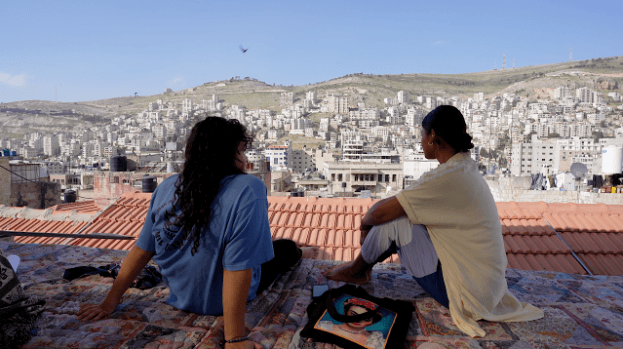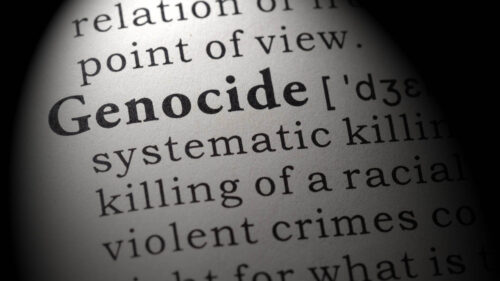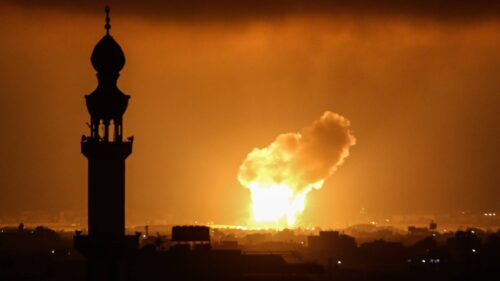I remember the first time I met a former member of Hamas. It was the spring of 2022. I had just arrived in Nablus, West Bank, and was invited to iftar (the evening meal during Ramadan) with several Palestinians, international students and visitors. It was the middle of Ramadan, and the city was so festive. My cousin and I had landed in Tel Aviv, Israel, the day before and traveled through checkpoints to reach Nablus. We had an idea for a documentary and decided to start in Palestine first. We didn’t know anyone here; we simply signed up for a work exchange program and booked our ticket. We needed to try to assimilate into the daily lives of Palestinians to understand what it was like to live under occupation.
During iftar that first night in Nablus, an international visitor asked our host, Basel, about the Israeli occupation. Suddenly, while discussing the state of affairs, Basel mentioned his time with Hamas during the second intifada. I immediately looked at my cousin. We exchanged uncomfortable glances. Growing up in America, any time we heard about Hamas, it was in the context of an extremist terrorist group. Did he hate America? Did he feel contempt for all people that didn’t follow Islam? Certainly, that couldn’t be true; several guests from different nations and backgrounds were at this dinner table. So many questions came to my mind, all fueled by fear and curiosity. I was uncertain about the source of my anxiety or the reason behind my feelings.
After we finished our meals, my cousin and I immediately excused ourselves. As soon as we were far enough from our hostel, we both looked at each other and burst into laughter. We were confused, scared, concerned and ultimately interested. We thought pressing questions out loud. Should we stay? Should we leave? The host seemed so kind and friendly. The image we had in our mind did not match up to the impression Basel had made in front of us. So we decided to stay. We came to Palestine to understand and live the Palestinian experience. Confronting our belief systems was just part of the process.
Hamas helps Palestinians create a community
Basel was the owner of Turquoise, a beautifully renovated hostel and cafe that he created with the help of his brother and sister-in-law in collaboration with their non-profit organization, The Yalla Project. The non-profit’s mission was to help rebuild the old city of Nablus and support local businesses. I spent a little over a month in Nablus, volunteering at Turquoise. We worked closely with Basel and soon learned that to Palestinians, Hamas wasn’t a terrorist organization. To people here, it was a resistance organization and a political group.
During the Second Intifada, the 2000–2005 Palestinian uprising against Israeli occupation, Basel’s role was to help people get in and get out of Nablus while it was under siege. He was arrested and imprisoned for 15 years. Basel spent so much of his life in prison, yet he gave me the impression of someone who lived each moment as if he never wanted to squander a single minute of life. During our volunteer stint, we watched Basel as he dedicated himself to nurturing Turquoise and aiding his community. He enthusiastically engaged us in various tasks. I sensed it was driven by Basel’s, and many other Palestinian men’s, experience of reentering a world that moved forward without them after imprisonment under occupation. They strive to compensate for lost time, aiming for greater strides and cherishing every moment.

It is important to note that Basel is no longer a member of Hamas. The organization also underwent significant change in those 15 years Basel was in prison. I learned about Hamas from Palestinians, understanding that it wasn’t just a part of the resistance movement, but a community service and a political party that organized social programs like education, healthcare and free meal programs. Perhaps many Palestinians do not agree with all of Hamas’s actions and core principles, but they still see Hamas’s function as a resistance to the illegal occupation. Palestinians do not have an army. They feel abandoned by their own government officials, who do not act on their behalf, especially when dealing with Israel’s government. I witnessed on multiple occasions how the Palestinian Authority would permit the Israeli occupation forces to raid the city and conduct special operations.
During my time in Palestine, my views on Hamas significantly changed. I became angered with the Israeli occupation forces and with the lack of support Palestinians had on the global stage. Why did Israel have the right to defend itself but not the Palestinians? Why were Palestinians subjugated to checkpoints and mass surveillance? Every aspect of Palestinians’ lives is monitored. Many of my Palestinian friends explained what Hamas meant to them, educating me on the organization’s core beliefs. Later, I learned that more than half of the members who joined Hamas were orphans, losing both parents due to the Israeli occupation that wiped out their entire families. I can understand how traumatic experiences can radicalize a person. Hell, just witnessing what Palestinians have to go through radicalized me.
The aftermath of October 7
A year later, on October 7, 2023, the world wakes up to Hamas’s uprising against Israel. No one in Palestine has ever seen anything like this. No one ever expected anything like this. No Palestinian I know is celebrating; they all know what this means. I know what this means. The media quickly spreads falsehoods, fabricating narratives of infants being beheaded without any evidence or verification. The world rushes to the aid of Israel. Calls from politicians, businessmen and celebrities to flatten Gaza and turn Gaza into a parking lot are swiftly put out. Headlines read “Hamas attacks Israel unprovoked.”
That day, I was at home in New York, reading and watching the media spiral. I was completely overwhelmed with fear and gripped with panic. Americans had no clue what was happening. They just read that Hamas attacked Israel. Hamas was the bad guy — the end. There was only one narrative saturating the media, the Israeli one. To speak up for Palestine was a death sentence to your reputation. To speak up for Palestine meant you supported Hamas in the eyes of the Western world, which meant you were a terrorist sympathizer.
Immediately after the Hamas attack, Israel began carpet bombing Gaza in an effort to pressure Hamas to release the hostages. We watched in horror as men, women and children were blown to pieces. We watched these videos from our phones. I remember curling up into a fetal position and weeping in bed. I wanted to speak up for Palestinians, but I was afraid. The Zionist regime is powerful — but did I go all the way to Palestine to be silent? I tearfully forced myself to record a video in defense of Palestinians.
I had prepared myself for the flood of hateful messages in response. Yet something interesting happened after I put out that video: thousands and thousands of people expressed their solidarity with Palestinians. The people mourned with me. People all over shared that they were utterly heartbroken. I realized that people do want to learn about the Palestinian struggle. As people slowly learned about this almost decades-long occupation, a distinct shift in mindset took hold. I began making daily videos on TikTok and Instagram hoping to educate people and share my knowledge and experiences with Palestinians. Soon, TikTok became saturated with pro-Palestinian content. Every day, we can sense an even greater awareness as the truth emerges. Israel was losing the narrative because the truth finally emerged, and it radically shifted our consciousness.

The word “radical” carries a negative connotation here in the West. It’s often used to describe belief systems that are too fervent, that would produce terroristic violence. Yet the word simply derives from the Latin radix, which translates to “root.” Figuratively, it evokes the ground, a foundation or a source. The more radical we become, we simply return to our roots as we tap into a source.
The injustice we are all witnessing in Palestine should cause outrage. It is a crime against humanity. There is evil deeply embedded in these sweeping acts of brutality, and at this moment, we must take a stand. Watching videos of children being slaughtered feels like an extreme provocation of our humanity, reaching the height of insanity. We are fighting a spiritual war. We are fighting an information war. The world is acknowledging that Palestinians deserve the right to self-determination just as much as we do.
That is why a group like Hamas exists. We see them for what they are: a resistance movement. I can empathize with the forces that compel Palestinians to fight for their right to exist, just as much as the Jewish people who led the Warsaw Ghetto Uprising. Hamas wasn’t created in a vacuum. The world has come to see how the United States has been funding the Israeli apartheid regime for decades while it ethnically cleanses Palestinians using our tax dollars. The world has come to see the terrible lies Israel senselessly spreads. The world has come to see Palestinians for the beautiful people they are. And this time, the bloodshed won’t be for nothing.
[Madelyn Lambert edited this piece.]
The views expressed in this article are the author’s own and do not necessarily reflect Fair Observer’s editorial policy.
Support Fair Observer
We rely on your support for our independence, diversity and quality.
For more than 10 years, Fair Observer has been free, fair and independent. No billionaire owns us, no advertisers control us. We are a reader-supported nonprofit. Unlike many other publications, we keep our content free for readers regardless of where they live or whether they can afford to pay. We have no paywalls and no ads.
In the post-truth era of fake news, echo chambers and filter bubbles, we publish a plurality of perspectives from around the world. Anyone can publish with us, but everyone goes through a rigorous editorial process. So, you get fact-checked, well-reasoned content instead of noise.
We publish 2,500+ voices from 90+ countries. We also conduct education and training programs
on subjects ranging from digital media and journalism to writing and critical thinking. This
doesn’t come cheap. Servers, editors, trainers and web developers cost
money.
Please consider supporting us on a regular basis as a recurring donor or a
sustaining member.
Will you support FO’s journalism?
We rely on your support for our independence, diversity and quality.










Comment